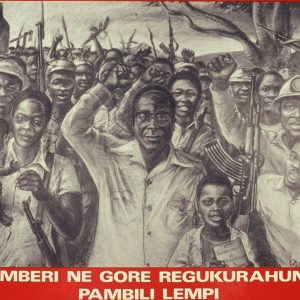Covid-19 just the latest excuse for British racism
In but a few months the coronavirus pandemic has spread across the world. It has been outpaced in places such as the UK only by the racism that has been given a focus by the virus.
Author:
6 May 2020

Racist incidents against Chinese Brits and the wider diaspora as a result of the coronavirus pandemic were reported a month before the United Kingdom’s first Covid-19 death. Right-wing commentators took the pandemic as an opportunity to attack China, with The Telegraph columnist Allison Pearson tweeting, “After this, let Made in China be a badge of shame” and the self-proclaimed “Mr Brexit”, Nigel Farage, stating: “China caused this nightmare. Period.” These sentiments are not completely out of place in the current coronavirus blame game in the UK.
It’s no surprise that Britain’s Chinese and other East Asian communities have felt under attack. Unfortunately it is not a new phenomenon, but one that has been growing in the country for a while, with China and Asians simply the latest target of Britons. Right-wing commentators increasingly use their platforms to attack minorities as hate crime increases on the UK’s streets.
The nation’s African communities as well as other minority groups have felt the growing tide of racism in the UK over the past few years now. Incidents of hate crime reported to the police in England and Wales more than doubled between 2013 and 2019, to 103 379, with about 75% of those being racially motivated.
“I don’t feel safe here, I’ll be frank,” is how one African migrant living in the UK describes her current situation and how it feels to be a migrant in a country that appears to have put anti-migration and a resurging nationalist identity on the top of its agenda.
Wanting to be identified only as Victoria, she added: “I never expected to feel that way about living here. And it has got worse – there’s a prime minister now in office who quite happily called black people ‘piccaninnies’ and that never came to spoil his vote.”
A history of impunity
Victoria is alluding to an article Prime Minister Boris Johnson wrote for The Telegraph in 2002 in which he used the phrases “piccaninnies” and “watermelon smiles” to describe people in the Democratic Republic of Congo.
Johnson has been accused of helping to foster a rise in racism in part due to columns he wrote in his capacity as a journalist for various right-wing British media outlets. In addition to that article, he also compared Muslim women wearing the veil to letterboxes in a more recent article for the newspaper The Daily Telegraph. Johnson has always defended himself by saying these quotes are taken out of context, but read them and judge whether the context, primarily using Africa to attack his political opponents, exonerates him as he believes it does.
In another article for the right-wing magazine The Spectator, which he later edited, Johnson penned a piece titled, “Africa is a mess, but we can’t blame colonialism”. It includes the following: “Consider Uganda, pearl of Africa, as an example of the British record. Are we guilty of slavery? Pshaw. It was one of the first duties of Frederick Lugard, who colonised Buganda in the 1890s, to take on and defeat the Arab slavers. And don’t swallow any of that nonsense about how we planted the ‘wrong crops’… If left to their own devices, the natives would rely on nothing but the instant carbohydrate gratification of the plantain.”
There is anger, particularly among black Britons and migrants, that these types of remarks make no dent in Johnson’s electoral popularity. It is an indication for them that at best the British electorate is ambivalent about this kind of racism, and at worst that this is a desired trait in an elected leader.
Related article:
Under New Labour, the UK pitched itself as a modern, progressive and global country that was developing a multicultural society. But in the past decade or so, many Brits grew unhappy about rising migration, culminating in the 2016 Brexit vote and the UK’s departure from the European Union. Multicultural Britain was no longer looked on as an ideal to be pursued, but rather became a symbol of what was wrong with the country and evidence of white Britons being neglected. Politicians were more than happy to carry that message.
Brexit also resulted in a resurgence of national identity and even the BBC was chastised by the government for not being patriotic enough. It was a surge that propelled the Conservatives to a landslide election victory at the end of 2019 on a strong anti-immigration platform.
Skewed reporting on racism
“Britain is back” has become the message from the government. Race relations, and migrants in general, have been among the biggest victims of this wave of patriotism.
Following the vote and the Tory landslide, the government has continued to struggle with race relations. Johnson’s top adviser, Dominic Cummings, recently hired an aide, Andrew Sabisky, who was forced to immediately resign after previous comments he had made in favour of eugenics and race-based IQ emerged.
“The Tories were not taken to task [in the run-up to the election] about what was going on in their own party, especially because the xenophobia was mainly about Muslims, so it wasn’t given the same priority [as antisemitism in the Labour Party],” said Victoria.
Hamza Ali, who moved from Somalia to the UK as a child and has been in the country most of his life, agrees that the Conservative Party was able to get away with Islamophobia. He says this has in part been helped by under-reporting in the press.
Related article:
“There’s a distinct anti-Islamic rhetoric made by middle-ranking Conservative members. It’s under-reported. If you had a Labour Party chairman say something antisemitic then it was reported,” he said. “I think there were instances of antisemitism in the Labour Party, but when you compare it to things like Islamophobia in the Conservative Party, the way it’s been reported and the way it’s been dealt with are very different. And I think the reason there’s a difference is because of the voice of who are criticising and whom they are criticising about this.”
Wellington Chiuria, a Zimbabwean health professional who has been in the UK since 2000, agrees that racism in the UK is coming as much from the media as from politicians. “I think the British media is rubbish. You saw what they did to Meghan [Markle]. It’s institutionalised racism, from the BBC to all the British press.”
Victoria goes further in her assessment of why racism and Islamophobia are not widely reported in the UK and subsequently allowed to go unchecked among politicians. “In order for that reporting to happen, black and brown people would need to be viewed as human first. And we’re so dehumanised it’s not really a priority,” she said.
Rise in discrimination and hate crimes
Worryingly, but predictably, this government rhetoric has been accompanied by an increase in violence and hate on the streets of the UK. “There’s an alarming and significant increase in hate crimes – of all sorts, by the way, not solely against people of ethnic minorities – antisemitism and attacks on LGBTQ [people],” said Hamza.
“I think we [Africans] were just caught in the crossfire. Being of a different colour, it’s more prominent, but their anger was more targeted at Eastern Europeans,” is how Wellington views hate crime in the country.
Even when African migrants are not deliberately the target, they are still on the receiving end of anti-migration anger. Whoever the target is, be it Asians for the coronavirus, Eastern Europeans or Muslims, African and black people generally are always collateral damage in Britain’s racism. If instead of the virus in 2020 it had been Ebola in 2014 that brought the UK to a halt, it is safe to assume Africans in the country would have been the target of commentators in the papers and violence on the streets.
It is not just through hate crime, though, that African migrants can face discrimination in the new UK. “Some of the carers who I work with don’t like to be led by a black person. Yes, they try to undermine my authority – things they wouldn’t do when there is a white person. This happens to most of the Africans and Indians that work here,” explained Wellington.
These are all elements that have existed in the UK before. They may be rising in prominence again, but they are sentiments that many feel never truly left the country. What is new, though, is a rejection of being able to call racist actions what they are, argues Hamza.
Related article:
“There’s an increasing shutdown of conversation about people calling out racism. The conversation has changed to a point now where people can stand up and tell you something’s not racist. It’s like someone stealing your lunch money and saying, ‘No, I’m not stealing your lunch money,’” he said.
It is symptomatic of a rise in Right and far-Right ideology across Europe and the United States that has developed “woke” as its prime target. This includes aggressively attacking those who accuse people of racism as part of “the woke, out-of-touch liberal metropolitan elite”. In Britain, this was personified by a guest on the popular political programme Question Time asserting that “Brits are tired of being called racist by people we pay for”. The comment was met with applause and shot him to right-wing commentator stardom for the week.
The casual dismissal of concerns over racism may be disturbing, but it seems to be part of the new UK. It is not, however, enough to drive people from the place they call home. “I think it’s worrying that it [the UK] is getting more racist, but I don’t give in to despair. It’s still my home,” said Hamza.



